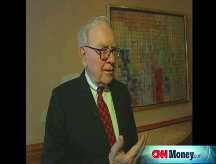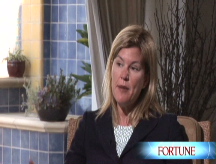Buffett: My fix for the economy
Investment guru proposes getting private investors involved in the mortgage bailout and warns that the $700 billion price tag may be too low.
(Fortune) -- Warren Buffett suggested Thursday that the U.S. Treasury team with private investors to buy the distressed mortgage assets at the center of the controversial $700 billion Wall Street bailout, and said the price tag of the rescue plan may have to rise.
Buffett, the chairman and CEO of Berkshire Hathaway (BRK.A), called the problems facing world markets "unprecedented" and warned of a "disaster" if Congress does not move faster to shore up the economy.
"We had an economic Pearl Harbor hit," he said during an appearance at FORTUNE's Most Powerful Women Summit in Carlsbad, Calif. "For a couple of weeks we've been arguing about who's at fault [and] fooling around while things have gotten a lot worse."
On Wednesday, the Senate passed a $700 billion bailout package. The House is expected to vote soon on the revised bill after rejecting an earlier version Monday.
Buffett said the bill isn't perfect, but it's a crucial step in the right direction. He then warned it will take a while to work and that the economy is going to struggle even with its passage.
"It will cost more to solve this problem today than it did two weeks ago," said Buffett, referring to when Treasury Secretary Henry Paulson's first proposed that Congress help rescue Wall Street after Lehman Brothers went bankrupt, Merrill Lynch was sold to Bank of America, and American International Group had to be rescued.
"If we don't get it solved next week," added Buffett, "I may go back to delivering papers."
Buffett didn't estimate how much more money would be needed to buy enough toxic mortgage investments in order to create a more stable market and get credit flowing again.
But he described a plan he thought of Thursday morning on the way to the Summit that would allow Treasury and private investors to buy assets together. He said his proposal would kickstart demand for mortgage-backed securities, help find a market price for these troubled assets and make it more likely that taxpayers would be made whole or even come out ahead in the bailout.
Under Buffett's plan, Treasury would lend hedge funds, Wall Street firms or any other investors 80% of the price for distressed assets. Investors would benefit from borrowing at lower rates available to the Treasury. But the government would get first claim on the sale of those assets, which means it would get its loan back plus interest and possibly turn a profit. Only then would investors see a penny.
"Now you have someone with 20% skin in the game," explained Buffett. "Believe me, I won't be overpaying if I'm buying with that kind of leverage. And you have someone [the investors] to manage the assets to the extent they need to be managed."
Buffett also noted that the presence of the government in the transactions would raise the price of assets above the absolute firesale levels for which they could now be sold. That would benefit the banks trying to unload them.
Since the credit crisis started, Buffett has made a $5 billion investment in Goldman Sachs (GS, Fortune 500) and a $3 billion investment in General Electric (GE, Fortune 500).
He said he was able to give an immediate answer Wednesday morning when GE called to request the cash infusion, suggesting he agreed to the deals without even consulting his own board of directors.
Buffett also said that, in return for his investment, top executives at Goldman Sachs and GE both agreed not to sell their stock in their respective companies for three years.
"There's an enormous advantage to being to act fast at a time like this," said Buffett. "People know they can call me and they can get an answer in 10 seconds....And we try to make them pay for the fact that it's an advantage to them."
The credit crisis has increased the volume of calls he's gotten from companies looking for Buffett to invest, he told the Summit.
"The fellow on the other end, usually the CEO, says 'The market looks at us as a toad. Berkshire Hathaway is looked at as a princess. And if you would just kiss us, we would turn into this handsome prince,'" said Buffett. "And I say, 'No, we would turn into a toad.'" Even so, he added, "we've kissed a few."
Buffett suggested he is still looking for deals and thinks it is a good time to be buying in the market.
He also praised some government officials dealing with the current crisis. He said Treasury Secretary Henry Paulson, who he described as a friend, is the right man to be guiding the government's rescue efforts and that he hopes whoever is elected president asks him to stay on.
And he singled out Federal Deposit Insurance Corp. Chairman Sheila Bair for particular praise for her work dealing with recent crises at Washington Mutual (WM, Fortune 500) and Wachovia (WB, Fortune 500). Washington Mutual collapsed and, in a deal brokered by the FDIC, was immediately sold to JPMorgan Chase (JPM, Fortune 500). Similarly, regulators orchestrated the sale of Wachovia's banking assets to Citigroup (C, Fortune 500) in order to prevent a failure there.
"In my book she stands higher than any CEO I know of in America today," he said, a statement met by applause by the women executives attending the Summit.
In a subsequent interview with CNNMoney.com, Buffett said he wasn't interested in placing blame for the crisis.
"I don't worry too much about pointing fingers at the past," he said. "I operate on the theory that every saint has a past, every sinner has a future."
He said the problem boils down to widely-held assumption during the housing boom that prices could only go up. And while the theory's flaws are all too apparent now, the misconception is understandable, said Buffett, pointing to previous asset bubbles going back centuries.
"There are not bad guys in that situation," said Buffett. "It's a condition of human nature." ![]()
-
 The retail giant tops the Fortune 500 for the second year in a row. Who else made the list? More
The retail giant tops the Fortune 500 for the second year in a row. Who else made the list? More -
 This group of companies is all about social networking to connect with their customers. More
This group of companies is all about social networking to connect with their customers. More -
 The fight over the cholesterol medication is keeping a generic version from hitting the market. More
The fight over the cholesterol medication is keeping a generic version from hitting the market. More -
 Bin Laden may be dead, but the terrorist group he led doesn't need his money. More
Bin Laden may be dead, but the terrorist group he led doesn't need his money. More -
 U.S. real estate might be a mess, but in other parts of the world, home prices are jumping. More
U.S. real estate might be a mess, but in other parts of the world, home prices are jumping. More -
 Libya's output is a fraction of global production, but it's crucial to the nation's economy. More
Libya's output is a fraction of global production, but it's crucial to the nation's economy. More -
 Once rates start to rise, things could get ugly fast for our neighbors to the north. More
Once rates start to rise, things could get ugly fast for our neighbors to the north. More















